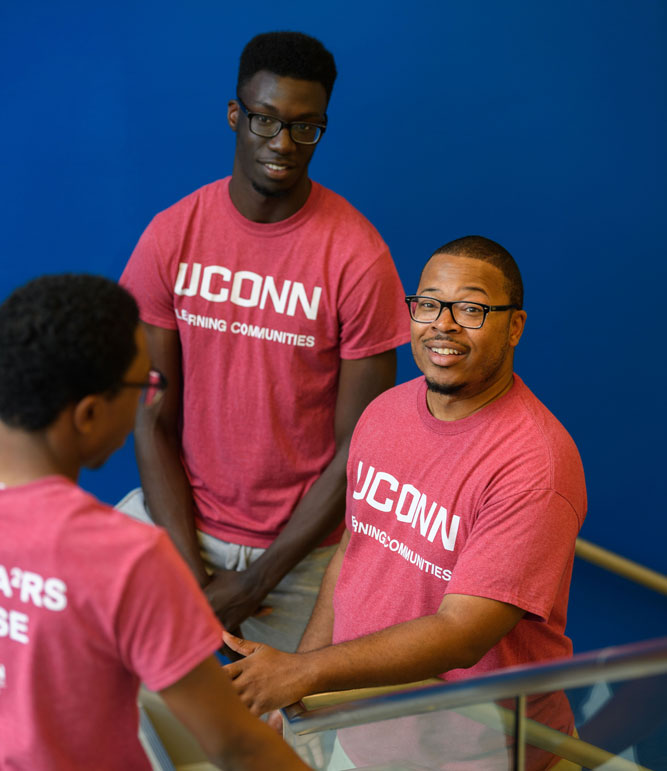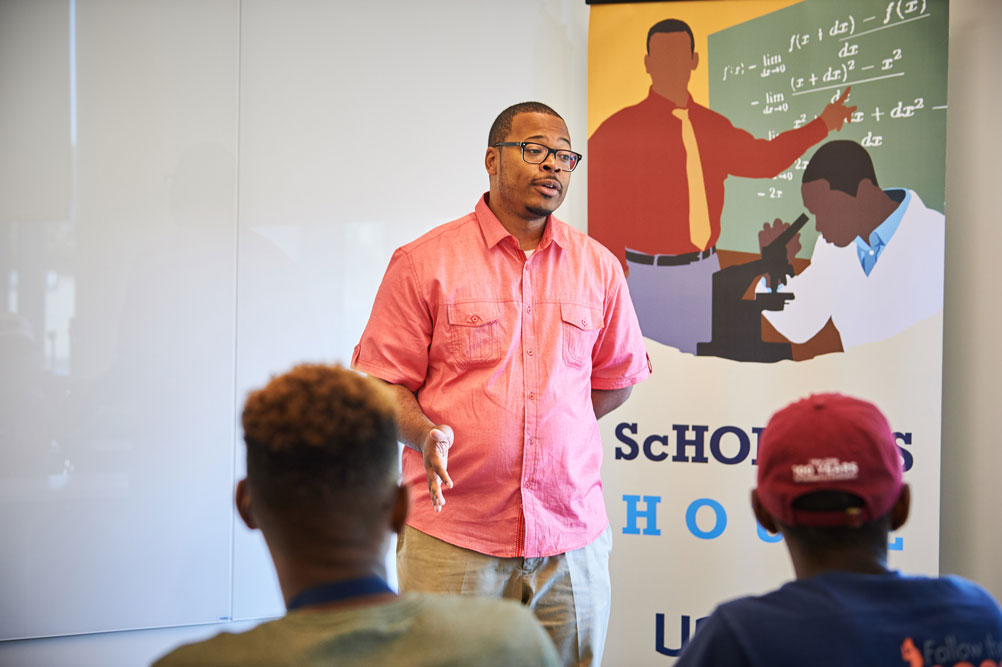Staying in College to Help Others Graduate
Mentors and guidance counselors helped Erik Hines, an assistant professor of educational psychology, find his path. Now he is paying it forward.
by Julie (Stagis) Bartucca '10 (BUS, CLAS)
photos by Peter Morenus
"All I think about now is solutions for improving the graduation rate for black males."
Erik Hines is passionate about helping black male students succeed at UConn. The assistant professor in the Neag School of Education says he is on a mission to help attract and retain African-American male students.
As faculty director of the new learning community ScHOLA²RS House, Hines hopes to gain a deeper understanding of the variables that influence positive academic and career outcomes for black males, the subject at the heart of both his day-to-day counseling work and his academic research. (ScHOLA²RS stands for Scholastic House of Leaders in Support of African-American Researchers & Scholars).
"He is all in," says Sally Reis, the former associate provost who brought Hines in to work on the newest of the University's learning communities. "He is completely dedicated to these young men, focused on their graduation from UConn and their success in graduate school and work. He is passionate, committed, and a remarkably strong mentor."
Born and raised in Tampa, Hines decided to become a school counselor while attending community college there. He went on to earn his bachelor's in social science education at Florida State University, his master's in education for school counseling at the College of William & Mary, and his Ph.D. in counselor education at the University of Maryland. He joined the UConn faculty in August 2014.
Hines says he is doing the work he set out to do at age 19. "My career feels purposeful, fulfilling, and empowering. All I think about now is solutions for improving the graduation rate for black males, recruitment of black males in STEM and career fields in which they are underrepresented, and how we help first-generation and other vulnerable populations be successful, too."
We caught up with Hines over the summer in his Gentry Building office, which overlooks a grassy, tree-lined knoll next to The Benton.

"We want to cultivate all of our students to be the best and brightest."


Dr. Hines seems to understand the barriers confronting Black Men at every age and stage of life in America. While America can be a beautiful place to live. It can also be harsh and so can UCONN. It would be great if we did not have to parse life in to racial, gender, class, and at times by age. After all of my years, I understand why it’s difficult for some Americans to understand why such programs are necessary. When people live most of their lives in an homogenized community, or in neighborhoods of privilege the need for diversity, inclusion, and adding the kind of supports that have been normalized can be a bit startling at first. We should wonder why is it that when the resources are counted and distributed why are the numbers for Black Men almost/always seem to lag. We are not naturally slow, lame or lazy. When and where ever we have been given the right tools, nurtured and supported we thrive. Thanks to Dr. Herbst for hiring staff and giving a green light to support development success and intellectual competitiveness at all levels and in every way.
Like Dr. Hines I was born and reared in Florida, but I was reared under Jim Crow. When I arrived at UCONN, albeit at one of the graduate programs we needed we needed to develop systems of support to manage the nagging and ever present micro-aggression’s while competing in the classrooms. 500 students out of 19,000, wow. – I take my hat off to Dr. Hines and know that your work will not be in vain.
If there is anything I can do to support your work please let me know.
Amos
Hat’s off to you sir. I teach young middle and highschool Black students how to anaylis data to make decisions here in Hartford. I’d be interested in learning more about your approach as well.
Well done. Glad to know that the university is doing something to improve the graduation rates for black males. Is there such a program for black females? I went to to UConn in the seventies and my son also graduated from UConn and there were no academic programs to support black students. Your work is gratifying and you appears passionate about what you are doing. We fully support you and wish you all the best.